 | | | I was in a graduate class on American history when my professor, Jesse Lemisch, then a leading young revisionist historian who had been fired from Yale for radicalism, got the news that his friend, Richard Flacks of the University of Chicago had been attacked in his office by a right-wing militia member of “The Minutemen.” Flacks hand had been nearly totally severed by his attacker who left a flier with the signature logo of the group – an image of a rifle scope with the words, “the crosshairs are on your back.” 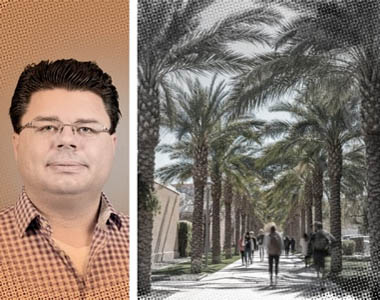 Lemisch was visibly shaken, pale, barely able to continue. Such attacks on professors and on the purported radicalism of academia are meant to spread fear and terror, to stamp out dissent and to stifle free inquiry and speech. Our lead story in this issue of the RCC Campus Dispatch details the assault on David Boyles, a queer writing instructor at Arizona State University, who was followed and harassed by two members of the far-right group, Turning Point USA. He was then shoved to the ground, bloodying his face. Boyles’ injuries were not serious, but the terrorizing intent and psychological impact of such attacks are. Lemisch was visibly shaken, pale, barely able to continue. Such attacks on professors and on the purported radicalism of academia are meant to spread fear and terror, to stamp out dissent and to stifle free inquiry and speech. Our lead story in this issue of the RCC Campus Dispatch details the assault on David Boyles, a queer writing instructor at Arizona State University, who was followed and harassed by two members of the far-right group, Turning Point USA. He was then shoved to the ground, bloodying his face. Boyles’ injuries were not serious, but the terrorizing intent and psychological impact of such attacks are. The attack on Boyles is, unfortunately, part of a wider assault on higher education by right-wing groups, state legislators, and MAGA followers who are banning books, eliminating diversity and anti-racism efforts and curricula on campus, cutting funding, and demanding that campus administrators disengage from “controversial” social issues. The goal of such anti-democratic and anti-intellectual assaults is clear. Create an atmosphere in which educators and students who take an intersectional and justice approach to environmental and climate justice issues – including discussions of race, poverty, inequality, corporate complicity, and human rights – are marginalized, penalized and ultimately removed. 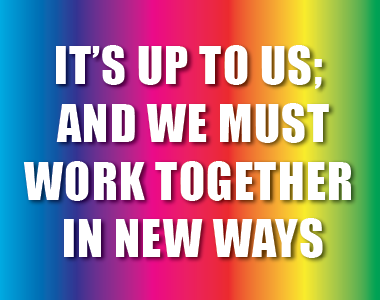 Fortunately, signs of resistance to these trends in higher education are beginning to emerge as indicated by the formation of a coalition effort signed by a long list of college Presidents and higher education associations like the American Association of American Colleges and Universities (AAC&U), AAUP, Campus Compact, and others. They have pledged to resist efforts to undermine American campuses' role of promoting diversity, democracy, and free inquiry. Fortunately, signs of resistance to these trends in higher education are beginning to emerge as indicated by the formation of a coalition effort signed by a long list of college Presidents and higher education associations like the American Association of American Colleges and Universities (AAC&U), AAUP, Campus Compact, and others. They have pledged to resist efforts to undermine American campuses' role of promoting diversity, democracy, and free inquiry.
At the same time, faculty and students nationwide continue environmental research, teaching, writing, organizing, and action despite the attacks on higher education. This positive trend is spreading far beyond the well-known liberal arts colleges and universities who pioneered much of campus environmentalism. Plymouth State University in New Hampshire, for example, has created new interdisciplinary climate studies programs that engage faculty and students from disciplines far beyond traditional environmental studies or science. The 83rd Annual Pennsylvania Communications Association Conference offers further evidence as faculty and students formed a “green team” from Westminster College in Pennsylvania that presented on the intersection of science, communication and social media at a session on “Rachel Carson: Listening to the Voices of Nature.” 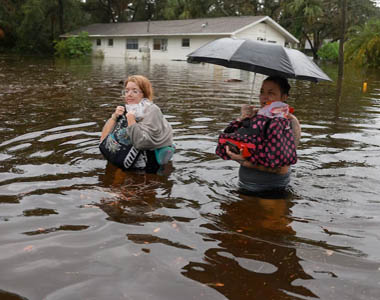 Climate research is also spreading more widely on campuses as we report on a new study by Andra Garner of Rowan University in New Jersey on how and why Atlantic hurricanes are intensifying more frequently and more quickly than ever. Climate research is also spreading more widely on campuses as we report on a new study by Andra Garner of Rowan University in New Jersey on how and why Atlantic hurricanes are intensifying more frequently and more quickly than ever.
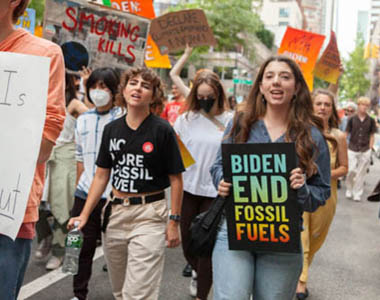 We are proud to report, too, that a new generation of student environmental leaders nationwide is active and fearless even in the face of growing conservative criticism of environmental action. In our section, “RCC Fellows Speak Out,” you’ll find nine powerful and persuasive essays from the 2023-2024 cohort of our RCC National Environment Leadership Fellows (formerly called RCC Fellows). They range from the power and importance of their protests at the September Climate Action March in New York City, to a searing account of how the Puyallup Tribe continues to suffer environmental injustices despite supposed protection from the 1845 Treaty of Medicine Creek, to an elegiac first-hand account of the slow destruction of the Smith Island community by sea-level rise, and more. We are proud to report, too, that a new generation of student environmental leaders nationwide is active and fearless even in the face of growing conservative criticism of environmental action. In our section, “RCC Fellows Speak Out,” you’ll find nine powerful and persuasive essays from the 2023-2024 cohort of our RCC National Environment Leadership Fellows (formerly called RCC Fellows). They range from the power and importance of their protests at the September Climate Action March in New York City, to a searing account of how the Puyallup Tribe continues to suffer environmental injustices despite supposed protection from the 1845 Treaty of Medicine Creek, to an elegiac first-hand account of the slow destruction of the Smith Island community by sea-level rise, and more. RCC Stanback Fellows from Duke University have also produced impressive environmental justice research including a groundbreaking examination of corporate misinformation from the leading industrial wood pellet producers, Enviva and Drax. In Greenwashing: A Report on the Corporate Selling of Polluting Wood Pellet Production, these undergraduate and graduate researchers document and refute the false claims that clear-cutting forests in the American South to produce wood pellets for use in Europe is clean, renewable and carbon neutral. Their report has been the centerpiece of an educational and organizing campaign that brought sixty frontline community members from Southern states to lobby in Washington and featured a second RCC Cape Fear riverboat cruise that looked at Enviva facilities in North Carolina. This fall also saw a burst of activity from the RCC on campus as President Bob Musil spoke at Duke and North Carolina State (NCSU), while RCC Policy and Programs Director, Maya Cohn, talked at Skidmore College. Hundreds of new faculty and students joined the RCC Campus Network (RCCN) as NCSU and Skidmore became the 65th and 66th members of the RCCN. | | | | | | | | 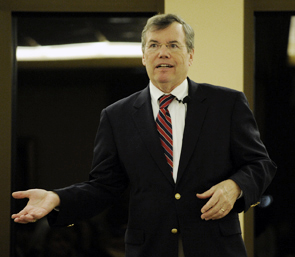 Bob Musil is the President & CEO of the Rachel Carson Council and author of Rachel Carson and Her Sisters: Extraordinary Women Who Have Shaped America’s Environment (Rutgers, 2016) and Washington in Spring: A Nature Journal for a Changing Capital (Bartleby, 2016). He is also the editor of the forthcoming annotated edition from Rutgers University Press of Rachel Carson’s Under the Sea-Wind with his Introduction, updated marine science, and historic and contemporary illustrations and photographs. Bob Musil is the President & CEO of the Rachel Carson Council and author of Rachel Carson and Her Sisters: Extraordinary Women Who Have Shaped America’s Environment (Rutgers, 2016) and Washington in Spring: A Nature Journal for a Changing Capital (Bartleby, 2016). He is also the editor of the forthcoming annotated edition from Rutgers University Press of Rachel Carson’s Under the Sea-Wind with his Introduction, updated marine science, and historic and contemporary illustrations and photographs. | | | | | | Arizona State Instructor Followed, Injured by Turning Point USA Crew Police investigate an altercation with a queer ASU educator as possible aggravated assault by an operative of the right-wing group. Two associates of the right-wing organization Turning Point USA followed a queer Arizona State University instructor on campus Wednesday afternoon, with one demanding he answer questions about “How long you’ve been attracted to minors” and “How long you’ve fantasized about minors having sex with adults” while the other filmed the encounter. | | | | | | | | Higher Education Leaders Build Coalition to Resist Anti-DEI Legislation Higher education and its mission to build a democratic, prosperous, and equitable society is under attack. In legislatures and courtrooms across the country, attempts to ban books, impose educational gag orders, limit what can be taught and by whom, and defund and discredit diversity, equity, and inclusion work in colleges and universities pose a monumental threat to the nation’s future. | | | | | | | | College Campuses Launch New "Climate Studies" Majors These interdisciplinary degree programs prepare students for careers in the public, nonprofit, and private sectors protecting the Earth. When Teagan Connelly was in high school in Connecticut, climate change grabbed her attention — and promptly threw her into despair. “While some people are in the denying stage of accepting climate change, I was in the ‘Oh no, the world is ending and we are all going to die’ stage,” she recalled. | | | | | | | | Communication of Science Focus of Interdisciplinary Presentation Westminster College students and faculty members from the School of Communication and Center for the Environment showcased their new interdisciplinary work at the 83rd Pennsylvania Communication Association (PCA) Annual Conference held at Slippery Rock University on Friday, Sept. 29. They presented “Westminster’s Green Team: Communication at the Intersection of Science, Sustainability, and Social Media,” delivered as part of the PCA’s salon session on “Rachel Carson: Listening to the Voices of Nature.” | | | | | | | | Study: Almost One in Four Undergrads Experienced Food Insecurity Significant portions of the college student population have faced food insecurity, according to an analysis of data from the National Postsecondary Student Aid Study: 2020 (NPSAS:20). NPSAS:20 – released earlier this year – offers the first nationally representative data collection about food insecurity and homelessness among U.S. graduate and undergraduate college students, according to Leanne Davis, managing researcher at Education Northwest. | | | | | | | | Fossil Fuel Divestment in U.S. Higher Education: Endowment Dependence and Temporal Dynamics Since 2012, students and others have pushed U.S. Higher Education Institutions (HEIs) to divest their endowments from fossil fuel producing industries. In the past decade, fossil fuel divestment has become the fastest growing divestment movement in history, with over 140 U.S. HEIs announcing divestment commitments. We conduct a quantitative analysis of the three phases of U.S. 4-year HEI divestment announcements (as well as rejections of divestment) to better understand the dynamics. | | | | | | | | 2 Ivies Will Up Their Municipal Payments. Is It Enough? Two Ivy League universities recently renewed agreements to voluntarily pay their surrounding cities sizable sums to help compensate for the fact that, as nonprofits, they don’t pay property taxes. And while some community members see the payments as generous and beneficial, students are among their harshest critics, arguing that the wealthy universities are capable of paying their host cities much more. | | | | | | | | | | How the Yale Unions Took Over New Haven A decade ago, blue-collar campus workers won a majority on the city council. Would an alliance with grad students dilute their power? The New Haven Green, a seventeenth-century park, is bordered on one side by courthouses and modest government offices, including the distinctive striped façade of New Haven’s city hall. On the opposite side are the lavish gothic buildings of Yale, the Ivy League institution with an endowment of forty billion dollars. | | | | | | | | Atlantic Hurricanes Intensifying Faster, More Frequently, Research Finds The list of major hurricanes that rapidly intensified before hitting the United States in recent years is long and memorable: Harvey, Irma, Maria, Michael, Laura, Ida, Ian and Idalia. All of those storms, starting in 2017, developed explosively over the Atlantic Ocean. Generally, this rapid escalation is increasingly recognized as part of a global phenomenon related to climate change and its associated warming of ocean waters. | | | | | | | | Warming Waters of the Arctic Could Pose a Threat to Pacific Right Whales Their food is moving north, but so are industrial fishing fleets As rising global temperatures push Arctic icecaps into retreat, large and small sea creatures and the commercial fishing boats that follow them are migrating northward. This mass migration toward the relatively narrow Bering Strait could lead to more ship collisions and gear entanglements for the extremely rare and critically endangered eastern population of North Pacific right whales | | | | | | | | Five Decades and a Mountain of Evidence: Study Explores How Toxic Chemicals are ‘Stealing Children’s Future Potential’ Children of color and from low-income families are not only exposed to more dangerous substances but also experience disproportionate harm to their brain development, researchers report. For over 2,000 years, the Indigenous people known as the Yupik have occupied St. Lawrence Island, a sliver of Alaska that rests in the Bering Sea just below the Arctic Circle. | | | | | | | | “Wonders and Realities of the Universe”: Rachel Carson’s Legacy Robert K. Musil, Ph.D., M.P.H., recently visited Duke to talk about Rachel Carson’s environmental legacy and its implications for North Carolina today. Musil is the president and CEO of the Rachel Carson Council, an environmental organization founded in 1965 by friends and colleagues of Rachel Carson — a twentieth-century marine scientist, conservationist, and writer — after her death. More than half a century later, in our world of climate crisis and biodiversity loss, Carson’s devotion to the natural world is still incredibly timely. | | | | | | | | Skidmore College Joins RCC Campus Network Skidmore College has become the 66th school to join the Rachel Carson Campus Network. The liberal arts college in Saratoga Springs, New York boasts a strong Environmental Studies & Sciences (ESS) program, integrating natural sciences, social sciences, humanities, and the arts. Maya Cohn, RCC’s Director of Policy and Programs and a graduate of Skidmore College, was invited to join a panel of expert alumni for the ESS department’s fall keynote lecture on September 26. | | | | | | | | Climate Injustice at (actually slightly above) Sea Level On one of the last truly hot days of September, I found myself seated on the upper deck of a ferryboat as the Western Shore of Maryland slowly faded into the distance behind me. At the eastern horizon, I watched as trees slowly peeked out of the Bay’s white-capped-dotted waters, appearing at first like the masts of a strange green ship rising out of the foam. That ship soon grew houses, docks, and boats; I knew then that I had sighted our day’s destination – Smith Island, Maryland. | | | | | | | | The Importance of Embracing Your Organizing Community On September 17th, alongside over 75,000 activists, I marched down the streets of Manhattan in New York City demanding an end to the fossil fuel era. 70 of these activists were college climate and financial justice organizers I had just met the day before. In unison, we raised our voices, danced, and embraced the power of our collective strength. Fossil Free Research, an international coalition of student organizers hosted a pre-march panel and community hour. | | | | | | | | Ecology by a Different Sound: Reverberations of Injustice in a Rural Southern Town In the opening of Silent Spring (1962), Rachel Carson tracks a sensory conundrum in a fictitious town located in the “heart of America.” She writes… “There was a strange stillness. The birds for example – where had they gone?... The feeding stations in the backyards were deserted. The few birds seen everywhere were moribund; they trembled violently and could not fly. It was a spring without voices. The mythic town Carson warns us about might as well be Sampson County, North Carolina. | | | | | | | | Advocating for Local Environmental Policy Doesn’t Have to be Scary Despite a growing list of environmental concerns affecting communities across the country, there is a chronic shortage of legislation aimed at curbing and addressing these issues. At the federal level, partisan gridlock has stymied bipartisan solutions. Similarly, progress at the state level is slow, with many legislatures also obstructed by partisan politics. This has left issues—ranging from PFAS water contamination to inadequate flooding preparation—unattended to and local communities vulnerable to a host of consequences | | | | | | | | A Sustainable Diet is Not Just About the Food you Eat, but Also What You Do With the Food you Don’t Eat My fellow volunteers and I were tasked with dissecting many smelly trash bags. On an unnaturally hot April day last semester, I spent hours sorting trash under the grueling North Carolinian heat. Along with a cohort of approximately fifteen other students, we tasked ourselves with auditing each piece of Duke University’s dining trash for a day. We hauled countless bags of trash from all of Duke’s on-campus dining locations to a makeshift auditing station in our busy quad. | | | | | | | | Empowering Student Governments: Catalysts for Sustainable Change in Universities The successful implementation of sustainability initiatives, particularly on a substantial scale within a university, needs not only the concerted effort of individuals but also the strategic deployment of political influence. And on campuses, much of that influence is encapsulated within the world of the student government. Student governments primarily function as intermediaries between the student body and the administration. | | | | | | | | Death to the Fishes in the Deep Blue Sea, Joy to PSE Washington State is one of the most beautiful places in the United States. Nestled in the greenery of old cedars and the world’s only temperate rainforest, lies the city of Tacoma. Tacoma is touted as great for retirees and has amazing views of the water and of majestic Mount Ranier. But digging into Tacoma’s history reveals a more complex story – one of injustices to Indigenous people and of modern corporate abuse. Tacoma is also known for its pungent smell. The odor can be credited to a paper mill, rendering plant, and oil refinery. | | | | | | | | Ending the Campus Throwaway Culture Moving into college is an exciting and essential part of the college experience, whether it’s your first time moving into a completely new place or you are a returning student excited to see your friends after a long summer. One aspect of moving in that excites many students, including me, is decorating your new room. And, if you are living in a house or apartment, also decorating common spaces. Every year in August and September, students empty local Walmarts of last-minute fans, mirrors, pillows, hangers, and more. | | | | | | | | The Intertwined Relationship Between Climate and Social Oppression When thinking about racism and classism, we tend to imagine direct offenses against individuals because of their identities. However, oppression goes beyond “personal biases.” It is rooted in our economic system: the state protects some communities while others are left to die. The feminist theorist bell hooks has coined the term white supremacist capitalist patriarchy. It directly describes the interconnected institutionalization of the oppressive system in which we live. | | | | | | | | Greenwashing Greenwashing: A Report on the Corporate Selling of Polluting Wood Pellet Production is the Rachel Carson Council’s (RCC) third comprehensive report exposing the wood pellet industry, following Clear Cut and Bad Business which respectively explore the “forces driving the wood pellet industry’s hold in the United States” and the “money behind the wood pellet industry.” Each report in the series discusses the severe environmental and climate damage caused by wood pellet production in the United States (U.S.). | | | | | | | | Swine and Suffering Swine and Suffering: An Introduction to the Hidden Harms of Factory Farms is the third report by the Rachel Carson Council calling attention to the environmental and health hazards of factory farms, or CAFOs, especially hog CAFOs and their overwhelming concentration in just a few small areas of the United States – Iowa, Minnesota, and North Carolina. Swine and Suffering is designed as a simple, useful short introduction for a new generation who, like those who have gone before, know little about where their food, especially their meat, comes from, or the consequences of its industrial scale production lives. | | | | | | | | Burning the Future: Shedding Light on the Destructive Wood Pellet Industry in North Carolina On September 30, 2023, the Rachel Carson Council (RCC) and the Southern Forests Conservation Coalition (SFCC) led a cruise down Wilmington, North Carolina’s Cape Fear river to expose the environmental health and ecological wreckage caused by the wood pellet industry. The world’s largest producer of wood pellets, Enviva, has laid waste to thousands of acres of forest in North Carolina and throughout the United States Southeast. | | | | | | | | RCC prides itself on its National Campus Network of 66 colleges and universities. We are working to engage faculty members, students, and administrators in our efforts for a more just and sustainable world. With our growing fellowship program, our presence on campuses across the country has never been greater. Contact RCC today to bring our staff to your campus for lectures, workshops, or meetings to help find the best ways to engage your faculty and students in the efforts against climate change, environmental justice, and the work of the Rachel Carson Council. Campus Visits with RCC President, Dr. Robert K. Musil 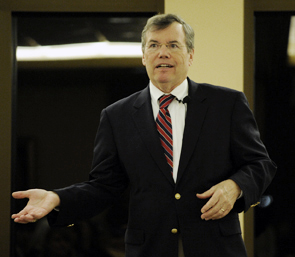 RCC President & CEO, Dr. Robert K. Musil, a national leader in climate change, environmental justice and health is again available to book for in-person campus speaking events! Musil has been called “informative, challenging and inspirational all at once.” He is “motivational” with “intellectual depth” and “extraordinary impact.” RCC President & CEO, Dr. Robert K. Musil, a national leader in climate change, environmental justice and health is again available to book for in-person campus speaking events! Musil has been called “informative, challenging and inspirational all at once.” He is “motivational” with “intellectual depth” and “extraordinary impact.”
Dr. Musil is available for campus lectures and visits involving classes, meetings with campus and community groups, consultations with faculty and administrators, or for Earth Day, Commencement, and other special events. Stays range from one to three days. Reduced fees are in place for 2023-2024 and can be designed to meet reduced budgets. To arrange a campus visit with Dr. Musil, contact the RCC President’s Office at office@rachelcarsoncouncil.org or call 301-214-2400. The RCC also offers talks, classes, and workshops on student engagement, activism, sustainability, and the RCC Fellowship program with, Associate Director of Civic and Campus Engagement, Mackenzie Bodman, Associate Director of Climate Justice, Bella Jaramillo, Associate Director of Communications, Claudia Steiner, Director of Policy and Programs, Maya Cohn. To arrange, contact Associate Director of Civic and Campus Engagement, Mackenzie Bodman. | | | | | | | |  The Rachel Carson Council Depends on Tax-deductible Gifts From Concerned Individuals Like You. Please Help If You can. The Rachel Carson Council Depends on Tax-deductible Gifts From Concerned Individuals Like You. Please Help If You can. | | | |  Sign Up Here to Receive the RCC E-News and Other RCC Newsletters, Information and Alerts. Sign Up Here to Receive the RCC E-News and Other RCC Newsletters, Information and Alerts. | | | | | | | | | | | |